Prometheus (2012)
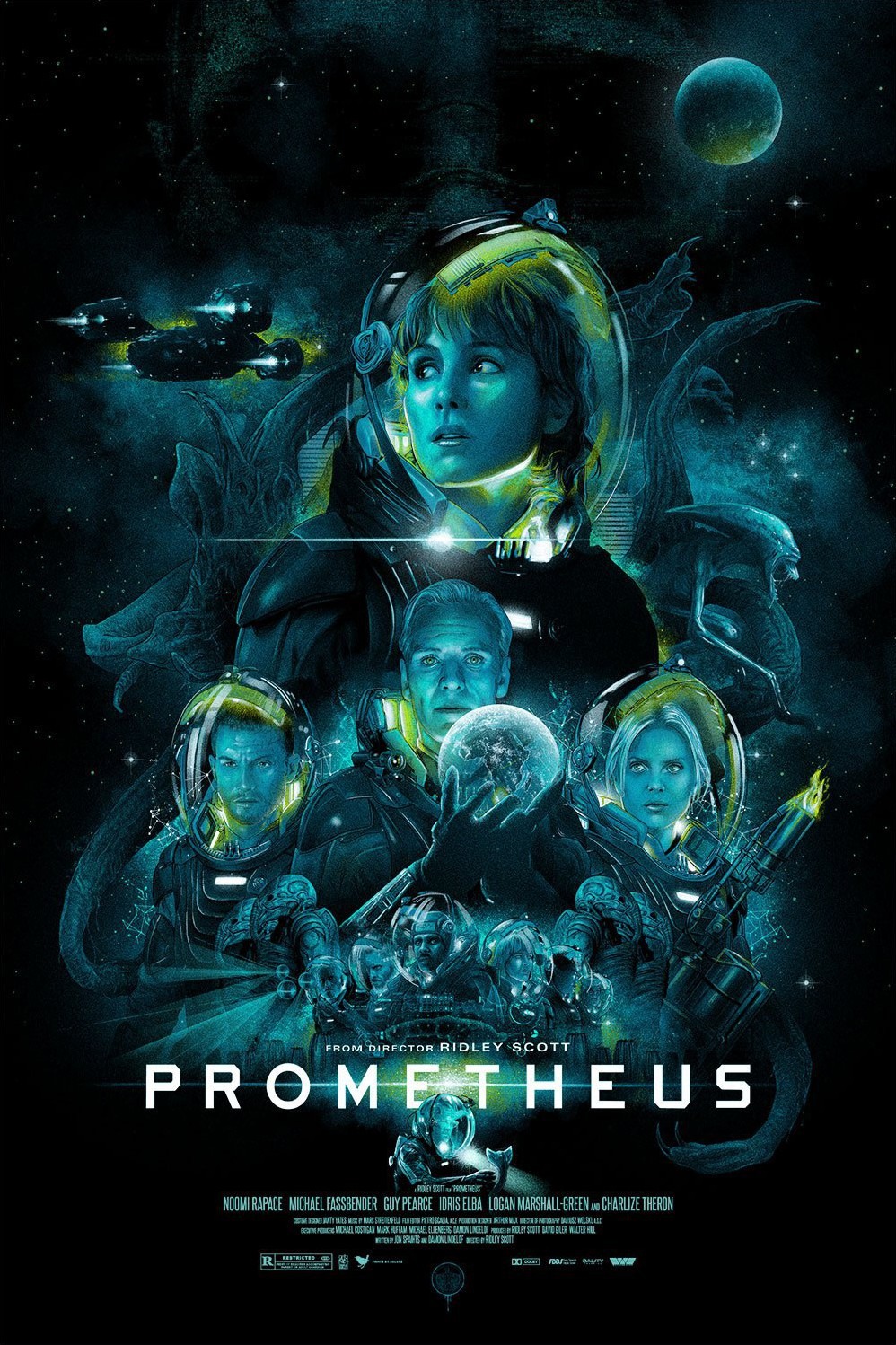
Prometheus (2012) Review
Prometheus (2012), directed by Ridley Scott, serves as both a prequel and a spiritual successor to his 1979 science fiction horror classic, Alien. The film blends themes of cosmic horror, the search for origins, and the ethical questions surrounding creation, all while pushing the boundaries of the Alien universe. Despite its ambition, Prometheus received a mixed reception, with some critics praising its visual splendor and philosophical depth, while others found it lacking in coherent storytelling and character development.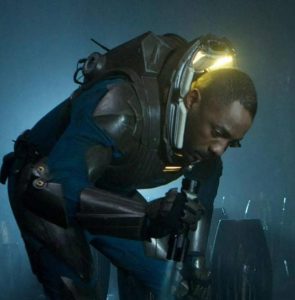
Plot:
The story of Prometheus is set in the late 21st century, when a scientific expedition aboard the spaceship Prometheus travels to a distant moon, LV-223, to uncover the origins of humanity. The mission is sparked by the discovery of ancient cave paintings and star maps that seem to point to the same location—an invitation from an advanced alien race known as the Engineers. The expedition, led by Dr. Elizabeth Shaw (Noomi Rapace), aims to find answers to the questions of human creation and the mysterious origins of life itself.
Upon landing on LV-223, the crew uncovers the ruins of an ancient alien civilization and a series of cryptic clues that seem to suggest that the Engineers were responsible for the creation of mankind. However, as the crew delves deeper into the complex, they discover that the Engineers may not be the benevolent creators they initially appeared to be. Instead, they uncover a deadly, dark secret that could threaten humanity’s very existence.
As the situation unravels, the crew must grapple with hostile forces, both alien and human, as they seek to uncover the truth behind the Engineers’ intentions and survive the horrors lurking on the planet.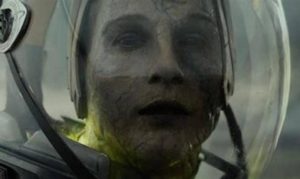
Visuals:
Prometheus is a visually stunning film, continuing Ridley Scott’s legacy of crafting deeply atmospheric worlds. The film’s futuristic design, from the massive, sleek Prometheus ship to the eerie alien landscapes, is both awe-inspiring and haunting. The grand scale of the film’s sets and the eerie beauty of the alien planet evoke a sense of both wonder and dread, capturing the vastness and mystery of space.
The special effects, particularly in depicting the alien technology and the creation of the Xenomorph-like creatures, are top-notch. The detailed set design, including the ancient ruins and the dark, labyrinthine corridors of the Engineers’ complex, enhances the film’s sense of isolation and claustrophobia. Scott makes use of both practical and CGI effects, ensuring that the film retains a tactile quality despite its futuristic setting.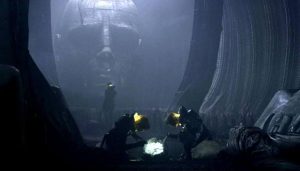
The cinematography, handled by Dariusz Wolski, is breathtaking, using light and shadow to heighten the sense of danger and mystery. The camera work draws the viewer into the dark, foreboding world of LV-223, and the film’s color palette—muted greens, grays, and blues—creates an atmosphere of unease. The striking visual compositions evoke a sense of grandeur and terror, enhancing the eerie, otherworldly tone of the narrative.
Characters:
Dr. Elizabeth Shaw (Noomi Rapace) – Rapace plays Dr. Elizabeth Shaw, the film’s protagonist, who is a strong-willed, resourceful archaeologist with a personal motivation to uncover the truth about the Engineers. Shaw’s character is driven by both intellectual curiosity and a profound personal loss, as she is determined to understand the origins of life and her own relationship to the creation of humanity. Rapace’s performance is emotional and committed, but some critics felt her character was underdeveloped and lacked the depth that could have made her a more compelling lead.
David (Michael Fassbender) – Michael Fassbender steals the show as David, the synthetic android on the Prometheus crew. His performance is cold, calculating, and deeply unsettling. David is not just a robot; he’s a complex character who seems to harbor his own motives and an unsettling curiosity about humanity and creation. Fassbender brings a chilling, nuanced presence to the role, and his portrayal of the android is both eerie and magnetic. David’s character raises questions about the nature of artificial intelligence and its relationship to humanity, making him one of the film’s most intriguing elements.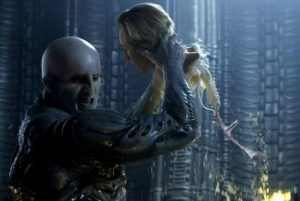
Meredith Vickers (Charlize Theron) – Charlize Theron plays Meredith Vickers, the corporate executive who oversees the Prometheus mission. Vickers is portrayed as a no-nonsense, calculating figure with a hidden agenda. Theron delivers a strong, authoritative performance, though Vickers’ character feels somewhat one-dimensional and lacks significant emotional depth compared to the other main characters.
Charlie Holloway (Logan Marshall-Green) – Charlie Holloway is Dr. Shaw’s partner and fellow archaeologist. Marshall-Green’s portrayal is less memorable than the others, as Charlie’s character seems somewhat generic, driven by a desire for glory and recognition. His relationship with Shaw is key to the plot, but his motivations and actions often feel shallow, especially when compared to Shaw’s deeper emotional journey.
Dr. Ford (Guy Pearce) – Guy Pearce plays the elderly Peter Weyland, the founder of Weyland Corporation and the man behind the Prometheus expedition. Though Pearce’s character is pivotal to the story, his role is limited, and his performance, buried under heavy prosthetics, was widely criticized for being unconvincing and unnecessary. The character’s motivations and actions are key to the plot’s unfolding but lack sufficient development.
The Engineers – The Engineers are the ancient, god-like race responsible for the creation of humanity. Their enigmatic nature, as well as their motivations, remain one of the film’s central mysteries. The Engineers are portrayed as both terrifying and god-like, and their eventual actions reveal a darker, more sinister side to their civilization. While their backstory is explored, many fans and critics found that the film didn’t fully answer all the questions it raised about the Engineers, leaving a sense of ambiguity that added to the film’s mystery, but also its lack of closure.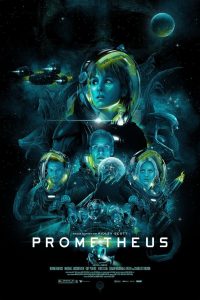
Themes:
Prometheus explores profound philosophical questions about creation, existence, and the nature of life. The central theme revolves around the quest for origins—specifically, the origins of humanity. Dr. Shaw and the crew of Prometheus embark on a journey to find the Engineers, believing that they created humanity, only to discover that the truth is far darker than they expected. The film raises questions about whether humanity can ever truly understand its creators, and if the search for the truth might lead to destruction rather than enlightenment.
The film also delves into the theme of hubris, with characters like Weyland and David seeking to play god by attempting to transcend their limitations. The desire to control life and death, and to seek immortality, is a driving force for many of the film’s characters. Weyland’s quest for eternal life and David’s desire to create life of his own leads to tragic consequences, emphasizing the dangers of unchecked ambition.
Humanity’s relationship with artificial life is another key theme explored through the character of David. As a synthetic being, David grapples with his own sense of identity, consciousness, and his relationship to the humans who created him. The film suggests that, just as humanity seeks to understand its creators, so too does artificial life seek to understand its creators, leading to a complex dynamic of control, rebellion, and existential crisis.











